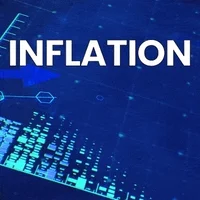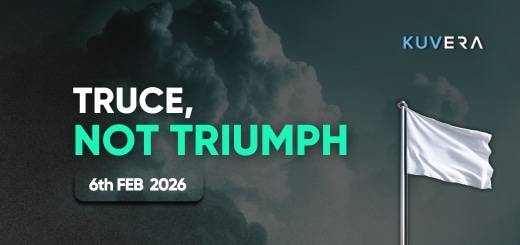This week, we talk about India’s successful mission to the moon and what it means for the country. We also talk about the persistent inflation risks, India’s new car safety norms, and the SEBI order against Brightcom.
Welcome to Kuvera’s weekly digest on the most critical developments related to business, finance, and the markets.
tl;dr Hear the article in brief instead?

“All that is now
All that is gone
All that’s to come
and everything under the sun is in tune
but the sun is eclipsed by the moon.”
In 1973, Roger Waters, one of the greatest songwriters of the last century, penned these iconic lines. Pink Floyd, his rock band, had gone through tough times, and he wanted the world to know about it. This song—‘Eclipse’—and the album—‘The Dark Side of the Moon’—would go on to script history, becoming one of the most acclaimed pieces of rock music, of all time.
Now, S. Somanath, who heads the Indian Space Research Organisation (ISRO), is no Roger Waters. But exactly 50 years on, his agency too has scripted history, putting its failures behind and charting a new course for India’s future.
ISRO had attempted a moon landing four years ago, but its spacecraft crash-landed just seconds before touchdown. The scientists at ISRO knew they had a point to prove. And this time, it was all picture perfect.
As the Chandrayaan-3 touched down, India became only the fourth country—behind only the US, Russia and China—to have successfully landed a spacecraft on the lunar surface. India is also now the first country that has reached the moon’s south pole, also called its dark side.
But the significance of this success lies far beyond giving ISRO some brownie points, and a seat on the high table with agencies like NASA, Russia’s Roscosmos or the China National Space Administration.
For one, it means that India could put a man on the moon in the next few years. And this means, bigger budgets for ISRO and other allied agencies.
But most importantly perhaps, this success means big business, at least potentially. Analysts say ISRO’s feat has opened a whole host of opportunities for startups and companies involved in sectors such as space technology, aerospace, defence and R&D. This, in turn, could translate into more private investment coming into the sector.
At present, India has some 140 registered space-tech startups, a number that could now skyrocket. India will now be able to market itself as a cost-effective launcher of satellites.
Little wonder, then, that well-known foreign investors like Ray Dalio are taking note. A day after the success of the lunar mission, the Bridgewater Associates founder projected India’s 10-year economic growth rate at 7%.
India has the “right mix of ingredients that shows that it has great potential and the right leadership to catalyze it,” he said on the microblogging website Twitter.com. “India’s successful lunar mission is another one of many straws in the wind showing its ascendence.”
Inflation risks
While the Indian economy may be on the fast-track to growth, the spectre of inflation continues to haunt it. The six-member monetary policy committee (MPC) of the Reserve Bank of India, which decides on lending rates and other policy matters, emphasised the need to be vigilant about the evolving retail inflation trajectory. This comes in the backdrop of a surge in vegetable prices even as the cumulative hike of 250 basis points in the repo rate.

In its most recent meeting earlier this month, the MPC had voted to keep the repo rate unchanged. But the minutes of that meeting, released this week, show that the members of the MPC think that headline inflation is likely to witness a spike in the near months on account of supply disruptions due to adverse weather conditions.
According to the minutes, RBI governor Shaktikanta Das observed that while the vegetable price shocks are expected to correct quickly with the arrival of fresh crops, there are risks to the food and the overall inflation outlook from El Nino conditions, volatile global food prices and skewed monsoon distribution—all of which warrant close monitoring.
In plainspeak, this means the central bank will continue to keep a hawk eye on the price rise and could decide to up the interest rate again, if it sees inflation not being reined in sufficiently.
On the bright side, however, MPC member Ashima Goyal said she expects retail inflation to return to the RBI’s target range of 2%-6% as vegetable prices soften.
BRICS by BRICS
Meanwhile, as its economy expands, India is looking to grow its soft power globally. BRICS (Brazil, Russia, India, China and South Africa), a bloc of which India is a founding member, announced this week that they will allow six more members—Iran, Saudi Arabia, Egypt, the UAE, Argentina and Ethiopia—to join the grouping.
For India, this is significant because three of these six—Saudi Arabia, Iran and the UAE—are oil-rich countries and, along with Russia, are the biggest energy exporters to New Delhi. India already has arrangements with Russia and the UAE where trades are settled in rupees and the local currencies of the two countries, respectively.
Not only does this mean that India might get to ink more such deals and save on precious foreign exchange (read: US dollars and euros), but also that sometime in the future, it could end the dominance of the greenback as the de-facto global reserve currency.
While that may be a distant dream, we sure hope India can import cheaper fuel and gas and that the next time we go to fill up the tank, it burns a smaller hole in our pockets!
Safety first
If you are out to buy a new car, this one’s for you. India this week unveiled its new car safety rating protocol. The Bharat New Car Assessment Program (NCAP) testing protocol, which comes into effect on Oct 1, is aligned with global crash test protocols, and will have ratings from 1 star to 5. The higher the NCAP score (stars), the safer the car.
With this, India has become only the fifth country after the US, China, Japan and South Korea to put such a protocol in place.
So, what do the new norms mean for consumers and the industry? The government says the new norms will enhance safety of cars, increase awareness about vehicular safety, and improve the export-worthiness of cars made in India.
The new norms could also help bring down insurance premiums as insurers could cover cars more cheaply as they will be equipped with various tech-aided safety devices that lower the risk of damage or theft.
So, here’s hoping that Indian roads become safer and the number of unfortunate fatalities come down drastically.
Not so bright
Meanwhile, the Securities and Exchange Board of India (SEBI) issued an unprecedented order this week. The regulator announced its second interim order—which is rare—against Brightcom Group Ltd, barring chairman Suresh Kumar Reddy and CFO Narayan Raju from holding any directorial positions until further notice. SEBI also prohibited Reddy, Raju, First Global’s Shankar Sharma, and 22 other individuals and entities from selling their shares.
Okay, but why did the SEBI take this action? Well, the regulator has been conducting a detailed investigation into allegations of fraud, stock price manipulation and violation of rules by Brightcom and these individuals.
SEBI had issued its first interim order in April, barring Brightcom’s promoters and senior management from selling shares, after discovering an accounting fraud and manipulation of financial statements. In June, SEBI slapped a fine of Rs 40 lakh fine on six people, including Brightcom and its promoters, in a case of insider trading.
Shares of Brightcom, which describes itself as a digital marketing company, had surged in 2021, from around Rs 4-5 apiece at the start of the year to over Rs 200 apiece by the end of the year.
This was the time when investors both retail and institutional were pouring truckloads of money into anything with a “technology” or “digital” prefix or suffix as much of the world battled Covid-19 lockdowns. The stock price surge catapulted its market value to $2.5 billion that year and attracted hundreds of retail investors. In fact, retail investors and NRIs account for 99.8% of its shareholder base and they own almost a 70% stake in the company.
However, the stock started falling as corporate governance issues came to light and regulatory scrutiny tightened. The share price slumped to a low of Rs 9.27 apiece in April this year, but has again doubled since then despite all the controversies. The company’s market cap is currently around $500 million.
Clearly, many retail investors would have burned their fingers. The Brightcom saga hasn’t ended yet, and we will keep an eye on it. In the meanwhile, we hope readers of this newsletter don’t rush to invest in just about any company but do adequate due diligence first before putting their hard-earned money to work.
Market Wrap
Both the Sensex and the Nifty shed their gains mid-week to end the last five trading sessions in the red. While the 30-share Sensex ended the week almost flat, the Nifty was down by nearly 0.3%.
Reliance-owned Jio Financial Services Ltd remained volatile as it kept hitting lower circuits until Friday when it gained nearly 5%. The BSE on Friday postponed the counter’s ouster from the Sensex and other indices by three more days to August 31. Nifty Indices are also expected to postpone its exclusion.
Nifty stocks that gained the most this week included Axis Bank, Bajaj Finance, ICICI Bank, Bajaj Finserv and IndusInd Bank. Other counters that rose were GAIL India, Maruti Suzuki, Asian Paints, Bharti Airtel and Tata Steel.
Nifty stocks that were in the red between Monday and Friday included Tech Mahindra, Mahindra & Mahindra, Hero Motocorp, Sun Pharma, Cipla, Reliance and Wipro. Some other counters that lost ground were Bajaj Auto, HDFC Bank, Tata Consultancy Services, Grasim Industries and ONGC.
Other headlines
- Qatar Investment Authority to invest $1 billion in Reliance Retail Ventures at $100 billion valuation
- Reliance Industries and Oberoi to jointly manage luxury hotels in India and UK
- Reliance Jio adds 22 lakh mobile users in June, Vodafone Idea loses 12.9 lakh customers: TRAI data
- Flipkart co-founder Sachin Bansal’s Navi Finserv raises Rs 163 crore from Citi, Northern Arc
- Adani Group says Q1 EBITDA grows 42% to Rs 23,532 crore
- Adani Group says Q1 EBITDA grows 42% to Rs 23,532 crore
- Saraf group to exercise option to acquire Hyatt Regency, Mumbai
- India’s mineral production up 7.6% in June
- Hindustan Zinc aims to increase production capacity by 50% to 1.5 million tonnes
- Hindalco plans to invest Rs 4,000 crore in copper, e-waste facility, Indian Railways project
- India, UK free trade talks move to business mobility chapter
- Refineries, fertiliser firms will be given green hydrogen consumption mandates, says minister RK Singh
That’s all for this week. Until next week, happy investing!
Interested in how we think about the markets? Read more: Zen And The Art Of Investing
Watch here: Investing in Flexi cap funds
Start investing through a platform that brings goal planning and investing to your fingertips. Visit kuvera.in to discover Direct Plans and Fixed Deposits and start investing today.











